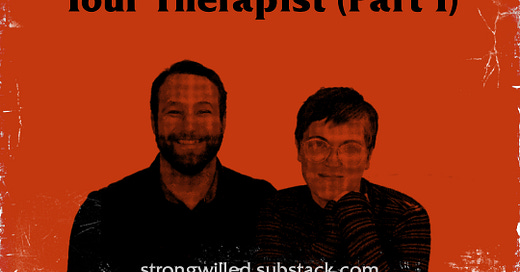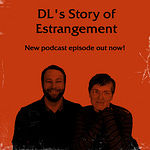STRONGWILLED is a multimedia project aimed at helping survivors of religious authoritarian parenting methods recover autonomy and find solidarity. Today we are so pleased to announce the launch of the podcast component of our project! You can listen by clicking on the link in this post, or subscribe to STRONGWILLED wherever you normally listen to podcasts.
In today’s podcast episode, titled Send This Episode to Your Therapist, we wanted to create a resource for folks to be able to have a snapshot of the impacts of growing up in a religious authoritarian parenting household that they can share with anyone — their therapist, friends, and loved ones. There are a few ways to access this content: you can find and listen to the STRONGWILLED podcast here or wherever you normally listen to podcasts. You can also find the video of the podcast over on our patreon (no subscription needed!). Or, you can read this synopsis below right here! If you are looking for the full transcript, please email us at strongwilledproject @ gmail . com.
This post is a condensed snapshot of the full podcast episode. It is designed to be easier to read and share with others.
So, what is Religious Authoritarian Parenting?
In the world of popular parenting manuals, there are usually three types of parenting approaches that are discussed: permissive parenting, authoritarian parenting, and authoritative parenting.
Most of the Christian parenting books we have read for STRONGWILLED that come from a white evangelical lens claim to be authoritative and not authoritarian. However, the end goal of popular (and perennial best-selling) Christian parenting books is that children will immediately comply with the authority in their life and that starts in the home—and, crucially, that obedience to authority continues on for the rest of their lives. So that's why we use the term authoritarian since that is the stated end goal of these materials. It also helps explain some of where we are in American society in 2024 where we are seeing people eager to vote for authoritarians. And when you add in religion as a means of getting children and people to comply with authority, you get an even more toxic stew. When we use the term “authoritarian” here at STRONGWILLED we aren’t simply talking about parenting styles but also political philosophies in general. Authoritarians believe that people desperately need to be controlled, and that society works best under a strict hierarchy: people who follow their leaders, women who follow men, and children who obey their parents.
When religion and the concept of god or a deity is introduced to young children in these kinds of frameworks, it serves to reinforce the hierarchy as “god’s will” and children are given little to no avenues to explore their personhood outside of their role in the hierarchy. (You can read more about the term Religious Authoritarian Parenting here).
Who Popularized Religious Authoritarian Parenting in the U.S.?
Dr. James Dobson (founder of Focus on the Family) published a book called Dare to Discipline in 1970 that became an instant best-seller. A psychologist and devout patriarchal Christian, Dobson counseled parents to use corporal punishments early and often in order to get their kids to immediately obey godly authority. Dobson promised parents that if they focused on discipline—especially during toddlerhood and adolescence—children would continue on complying with godly authority for the rest of their lives. This compliance to authority instilled in childhood would also mean that individuals raised in these home would never differentiate or individuate to form their own opinions or political viewpoints, nor would they leave the rigid gender and sexual roles assigned to them.
Dare to Discipline sold millions of copies and became a hallmark of Christian parenting methods from the 1970s to the present day. In 1977 Dobson published The Strong-Willed Child, which taught parents how to double down on the willful defiance of children who would not or could not immediately obey authority (which, tragically, includes many neurodivergent children). The Strong-Willed Child also became a best-seller, and Dobson recorded lectures where he outlined the thesis to both of his parenting books that were widely distributed and seen across America. He claims that one-third of the American population was exposed to his particular parenting methods in the 1980s alone1.
While these books might not be on the shelf of every white evangelical home, most fundamentalist Christian churches in the United States utilized these religious authoritarian parenting methods and pressured parents to use them. Sunday mornings became the place where parents proved if they were using godly discipline to get their children to obey or not. If your kids were acting up in church, people would tell you to read Dobson books and spank your children and the social pressure was immense. The goal in these communities was not developing emotionally intelligent or healthy children, it was on having obedient children.
James Dobson pivoted to start Focus on the Family, where his writing and radio preaching of the gospel of patriarchal families impacted millions of people. As evidenced by his political activism in the past several decades, it is clear that from the start Dobson had a political agenda to his parenting methods. He, like many other white male conservatives, started focusing on (white) families to help them grow and replicate their values in their children, a movement that continues on to the present day.
What are the hallmarks of Religious Authoritarian Parenting?
1). Unquestioning Obedience to God-ordained Authorities
The overarching goal of RAP methods was to create children who immediately obeyed their parents, no matter what. Using corporal punishment like spanking, pinching, and more, young children were taught that disobedience or asserting their own will was likely to be met with pain, and shame. For conservative families, there was no end date for when children grow up to be adults with their own autonomy. Instead this unquestioning obedience was supposed to continue on in the form of life-long deference to parents, pastors, the police, and conservative political leaders.
Some of the personal impacts on people who grew up in RAP homes include:
Fawning or extreme people-pleasing, especially to authority figures
Difficulty asserting for self in power-differential settings
Acceptance of unfair treatment
Taking care of parents’ emotions
2). Acceptance of Hierarchical Roles
A large part of this political agenda to uphold patriarchal authoritarianism was centered around teaching children gender essentialism. There was an enormous focus in conservative Christian churches on the difference between boys and girls. Many of the materials for adolescents in evangelical Christianity were gender-specific, with girls and people socialized as female bearing the brunt of toxic teachings about sexuality known as “purity culture.”
Here's an example of the gendered approaches in Christian media:
Breakaway magazine for boys:
Focus on “cool” alternative Christian band and extreme outdoor sports like rock climbing.
Brio magazine for girls:
Same cool band, but this issue has multiple articles aimed at making teenage girls ashamed of any sexual activity outside of marriage and preparing them to attract and marry Christian boys2.
The rigid gender roles assigned to children in religious authoritarian homes impacted multiple facets of life, including education and career opportunities. Parents and caregivers utilized religious language to engage in what Lindsay C. Gibson calls “role coercion.” Parents claimed that they weren’t controlling their children but were simply “following the Bible” and urging their kids to obey God’s design for sexuality, gender, family relationships, and even civil society.
Some of the long-term personal impacts of this acceptance of hierarchical roles include:
Indoctrination regarding Patriarchy and gender essentialism
Purity culture
Career/life decisions and role coercion
Suppression of identity to gain in-group status
3). Acceptance and Replication of Political Values.
Dobson was very upset that in the 1960’s young white adults were protesting (sometimes on behalf of Black rights), and set out to teach parents how to parent in a way that kids would maintain Conservative political status quo. Conservatives were losing power in the US politically, but if (white) conservative families could raise kids to vote and take political action, then they could regain political power. He told parents that if they followed his parenting approach, by the time children were adolescents, they would accept their parents' political values (and maintain them into adulthood).
In addition to teaching particular parenting methods, this movement created a whole youth culture surrounding conservative values. Teenagers could read magazines (like the ones mentioned above) about Christian rock bands, or other types of “teenage culture” that was loaded with the same ideology—because it was primarily media produced by Dobson’s organization, Focus on the Family.
Many kids who grew up in RAP homes had very strict, limited information. DL was homeschooled, their parents used textbooks with intense Christian nationalist ideology, and they weren’t exposed to outside perspectives.
Alternatively, while some kids were isolated, many (like Krispin) were taught to engage in outside culture (like going to public school), but to filter information according to the religious world view. So a teenager might be exposed to alternative points of view, but they would quickly discount it as “non-Christian,” which helped keep kids within the fold and prohibited them from exploring their own identity or creating their own set of values.
Some of the dynamics that this creates are:
Limited access to education (constricted education; demonization of outside sources, media, and science)
Children experiencing a delay in gaining information about and understanding of the world
Tensions in the family if the children don’t become conservative Republicans
4) Acceptance of Life-Long Parental Influence
RAP authors taught that parents should expect to have life-long influence on their children, and that a healthy, strong, close family will include that adult children will continue to view their parents with a sense of authority. Authors like James Dobson, Bill Gothard, John MacArthur and more taught parents that if they disciplined correctly, then their children would continue to defer to their parents into adulthood.
This creates an ongoing power differential, in which adults who grew up in this environment often feel they have to receive permission for, or justify, their life decisions with their parents. They often worry about being “in trouble,” and often have an outsized awareness of how their parents would feel about their choices, even if their parents will never know. This undermines a sense of agency and autonomy, and causes adults who grew up in these homes to often make decisions that would make their parents happy rather than themselves. Lindsay Gibson calls this, “role-entitlement” when a parent believes they have a special privilege in their child’s life simply because they are their parent.
This also has a huge impact on how people express or explore their gender and sexuality, since they have often been trained to make decisions based on their parents’ homophobic and patriarchal beliefs. Rather than exploring their own desires and their own individuality, children are pressured to conform to the very narrow roles assigned to them at birth.
RAP ideology creates an expectation in parents that children will defer to their values and point of view, even as they become an adult. Parents aren’t taught about the concept of differentiation as children grow into adults, which often causes conflict, or a family dynamic where an adult child struggles to hold their own point of view or values if they differ from their parents.
Some of the long-term personal impacts of this acceptance of hierarchical roles include:
Adults making decisions based primarily on their parents’ values
Intense conflict between parents and their adult children who do disagree
Adult children who feel responsible for their parents’ feelings and comfort
5). Using Spirituality/Religion to Promote Obedience and Submission
Religious authoritarian parenting is unique because it uses religion to promote life-long obedience to godly authority. Children are routinely reminded that God is always watching their behavior, so even if children are outside their parents’ purview—like at school or a friend’s house—they have a sense that they are being monitored at all times, by a deity who could punish them for bad behavior.
This is similar to Jeremy Bentham’s Panopticon concept he invented for managing behavior in prisons: one guard could see all the prisoners at any given moment, which caused them to feel constantly monitored, making them easier to control. Similarly, religious authoritarian parents use the idea of an all-seeing deity to promote a sense that a children is always being observed.
Furthermore, the ideological system promotes unquestioning and instantaneous obedience, and even teaches explicitly that obedience is the same as love. Children, who want to love and want to be loved, learn to obey in order to get attachment needs met. The religious system takes these dynamics beyond simply parent-child dynamics, and makes a child feel that their eternity is at stake, based on whether or not they obey and adopt their parents’ values.
6). Targeting Developmental Phases for Intentional Delays
In this parenting framework, parents were taught to see normal expressions of autonomy and individuality as evidence of sin nature. For example, two-year-olds often refuse to obey their parents, but developmental psychology understands this as a normal process, rather than evidence that a child is sinful. RAP takes a similar approach to the individuality that teenagers express. It’s important to reflect on what it means to grow up with parents that believe that you are, at your core, sinful, broken and selfish.
Marlene Winell, author of Leaving the Fold, has suggested that children growing up in this kind of environment often experience developmental delays, whether it’s lack of access to science and history, or a delayed process of understanding their gender and sexuality. You can read more about these developmental delays on Winell’s website, specifically the post titled Childhood Religious Indoctrination.
Whether you are someone who was raised with RAP methods, a therapist who works with religious trauma clients, or somebody who is simply interested in these topics, we hope you found this resource to be helpful. STRONGWILLED is a reader-supported publication and we are so grateful for all of the support we have received — there are over 2,000 of you here! You can help this project continue on by liking, sharing, and subscribing to the Substack and by supporting us financially.
Who we are:
D.L. Mayfield (they/them), is an autistic non-binary writer and parent. D.L. grew up as a homeschooled evangelical pastor’s kid, and spent many years in the Christian writing world before deconverting from Christianity in 2022, and they enjoy deep diving history in order to find patterns.
Krispin Mayfield (he/him), is a licensed therapist and author who specializes in religious trauma and neurodivergence. Krispin was also raised evangelical and spent his teenage years as a missionary kid before also leaving Christianity in adulthood. Krispin and D.L. have been married for almost 17 years and are the parents of two incredible children.
Why this episode:
We wanted to create a resource for survivors, those who love them, and their therapists because there are particular aspects of growing up in a religious authoritarian household that impact how someone views themself and the wider world. Currently, many of the resources around religious trauma are geared towards people who are still in Christianity or some kind of religious faith. Here at STRONGWILLED we wanted to provide resources for survivors that include people who have left religion, and provide information for therapists and loved ones who have no background or knowledge of what religious authoritarian parenting entails.
In the next episode, we’ll continue to discuss the dynamics of Religious Authoritarian Parenting, focusing on what kind of family dynamics it creates. We’ve touched on some of the impacts between parents and children, especially as they grow into adults, but we need a whole episode to explore how this kind of parenting impacts families. Stay tuned!
To read more about Dr. Dobson (and contrast him with his peer, Fred Rogers) see one of our previous chapters:
Chapter 6: Blame the Rebellion on Mr. Rogers
STRONGWILLED is a reader-supported publication. We are so grateful for everyone who has liked, shared, and supported this project. We have a limited number of paid subscriptions available to people who identify as part of the LGBTQIA+ community who are in financial need. Please email us at strongwilledproject@gmail.com and we will grant them on a first-…

























Share this post